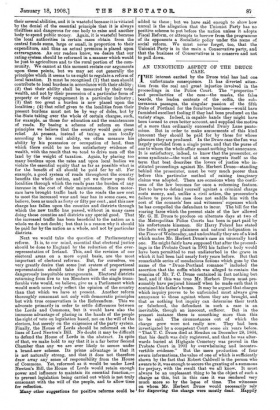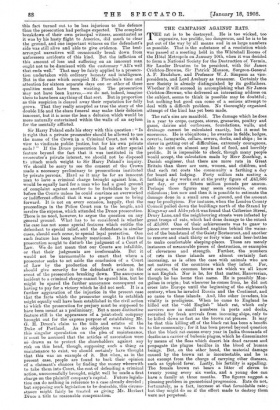AN UNNOTICED ASPECT OF THE DEUCE CASE. T HE interest excited
by the Druce trial has had one unfortunate consequence. It has diverted atten- tion from the real and great injustice involved in the proceedings in the Police Court. The " properties " and peculiarities of the case—the masks, the false beards, the leaden contents of the coffin, the sub- terranean passages, the singular passion of the fifth Duke of Portland for the furniture business—would have furnished excellent fooling if they had been produced on the variety stage. Indeed, in capable hands they might have been turned to even better account, and supplied the motive of a more than ordinarily successful Drury Lane panto- mime. But in order to make amusements of this kind innocent they should be paid. for by those for whose pleasure they are produced. In the Druce case the fun was largely provided from a single purse, and that the purse of one to whom the whole affair meant nothing but annoyance. It is satisfactory, indeed, to know that the prosecutor, or some syndicate—the word at once suggests itself as the term that best describes the lovers of justice who in- stituted proceedings against Mr. Herbert Bruce—standing behind the prosecutor, must be very much poorer than before this particular method of raising imaginary claims was adopted. There are occasions when the costli- ness of the law becomes for once a redeeming feature. But to have to defend yourself against a criminal charge costs money, and, unlike a civil action, the prosecutor's failure to prove his case does not saddle him with the cost of the counsels' fees and witnesses' expenses which he has compelled the defendant to incur. The bill for the roaring farce which the present state of the law allowed Mr. G. H. Druce to produce on alternate days at two of the Metropolitan Police Courts has been in part paid by his unfortunate kinsman. Sir Harry Poland has stated the facts with great plainness and natural indignation in the Times of Wednesday, and undoubtedly they are of a kind which makes Mr. Herbert Bruce's case an unusually hard one. He might fairly have supposed that after the proceed- ings in the Probate Court in 1901 his father's body would have been permitted to rest undisturbed in the grave in which it had been laid nearly forty years before. But that remarkable series of mendacious fictions which goes by the name of the "Druce-Portland romance" included the assertion that the coffin which was alleged to contain the remains of Mr. T. C. Druce contained in fact nothing but lead, and if this was true Mr. Herbert Druce must pre- sumably have perjured himself when he made oath that it contained his father's bones. It may be argued that charges which inquiry proves to be unfounded must always give annoyance to those against whom they are brought, and that as nothing but inquiry can determine their truth or falsehood, the defendant in such a, case is an inevitable, though an innocent, sufferer. But in the present instance there is something more than this to be said. The circumstances out of which the charge grew were not really new. They had been investigated by a competent Court some six years before. "That T. C. Druce died at Hendon on December 28, 1864, that his death was duly registered, and that he was after- wards buried at Highgate Cemetery was proved in the Probate Court in 1901 by overwhelming and incontro- vertible evidence." But the mere production of four sworn informations, the value of one of which is sufficiently shown by the fact that Robert Caldwell is the person who swears to it, was enough to secure the granting of a summons for perjury, with the result that we all know. It must always be an unpleasant thing to be the object of such a charge as this, but in this case it was rendered very much more so by the lapse of time. The witnesses on whom Mr. Herbert Druce would necessarily rely for disproving the charge were mostly dead. Happily this fact turned out to be less injurious to the defence than the prosecution had perhaps expected. The complete breakdown of their own principal witness, accentuated as it was by his hasty flight to America, did much to clear the ground, and one important witness on the defendant's side was still alive and able to give evidence. The best- arranged narratives will occasionally break down from unforeseen accidents of this kind. But the infliction of this amount of loss and suffering on an innocent man ought not to be dismissed with the customary "All's well that ends well." That may be fairly applied to a prosecu- tion undertaken with ordinary honesty and intelligence. But in the case whieh occupied Mr. Plowden's time and attention for sixteen separate days one or other of these qualities must have been wanting. The prosecution may not have been knaves,—we do not, indeed, imagine them to have been anything of that sort. But in proportion as this suspicion is cleared away their reputation for folly grows. That they really accepted as true the story of the double life and the sham funeral may make their delusion innocent, but it is none the less a delusion which would be more naturally entertained within the walls of an asylum for the mentally afflicted.
Sir Harry Poland ends his story with this question : "Is it right that a private prosecutor should be allowed to use the name of the Crown in a Criminal Court, not with a view to vindicate public justice, but for his own private ends ? " If the Druce prosecution had no other special feature beyond the fact that it was instituted in the prosecutor's private interest, we should not be disposed to attach much weight to Sir Harry Poland's inquiry. We should be sorry to see the consent of the Crown made a necessary preliminary to prosecutions instituted by private persons. Hard as it may be for an innocent man to have a criminal charge brought against him, it would be equally hard for a man who had a good ground of complaint against another to be forbidden to lay it before the Courts unless lie could convince an overworked or indifferent official that it was a proper case to bring forward. It is not on every occasion, happily, that the proceedings in the Police Court run to the length, and. involve the expense, which attended the Druce prosecution. There is no need, however, to argue the question on any general ground. What has to be considered is whether the case has not some special features which entitle the defendant to special relief, and the defendants in similar cases, should such occur, to special legal protection. One such feature has been already mentioned. It is that the prosecution sought to disturb the judgment of a Court of Law. We do not mean that our Courts are infallible, or that their judgments are irreformable. But it would not be unreasonable to enact that where a prosecutor seeks to set aside the conclusion of a Court of Law by the production of fresh evidence, he should give security for the defendant's costs in the event of the prosecution breaking down. The annoyance incident to a criminal charge cannot be spared him, but be Might be spared the further annoyance consequent on baying to pay for a victory which he did not seek. It is a further aggravation of the injustice in the present case that the facts which the prosecutor sought to establish might equally well have been established in the civil action td which the prosecution for perjury must be supposed to have been meant as a preliminary. -But a, more distinctive feature still is the appearance of a joint-stock con]pany brought out for the express purpose of establishing Mr. G. H. Druce's claim to the title and estates of the Duke of Portland. As no objection was taken to this singular speculation on the plea of maintenance, it: must be assumed that the articles of association were so drawn as to protect the shareholders against any risk on this head, though, supposing such a thing as Maintenance to exist, we should certainly have thought that this was an example of it. But when, as in the present case, people are found to back their opinion of a. claimant's chances by finding the money wherewith to take them into Court, the cost of defending a criminal action, unsuccessfully brought, might well be made a first charge on the plaintiff company's capital. Future legisla- tion can do nothing in reference to a case already decided ; but supposing such legislation to be desirable, this circum- stance might fairly ae treated as giving Mr. Herbert Druce a title to reasonable compensation.







































 Previous page
Previous page